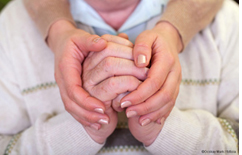Parkinson's – a good life thanks to early diagnosis

Trembling is the most typical symptom of Parkinson's disease. But muscle rigidity, balance disorders and REM sleep disturbances can also be an indication. The sooner the diagnosis is made, the better the disease can be treated.
Parkinson's disease is one of the most common progressive disorders of the nervous system. Even though a cure has not been achievable thus far, today the disease can be treated very well. Parkinson's disease: the boxing star Muhammad Ali suffered from it, as well as the cooking icon Paul Bocuse. In Germany about 220,000 people are affected by it. "Parkinson's is one of the most treatable neurological diseases today. Unfortunately, it is recognized too rarely and often too late," says Dr. Michel Rijntjes, Senior Physician in the Department of Neurology and Neuroscience of the Medical Center - University of Freiburg.
Cause of the disease only partly understood
The cause of Parkinson's disease is still not clearly understood despite intensive research. What is clear is that nerve cells in the midbrain, which release the messenger substance dopamine, gradually die. These cells are central to the coordination and control of movements. Genetic factors as well as environmental influences are discussed as possible causes of the death of the nerve cells.
Smelling disorders can be an early warning signal.
The most characteristic symptoms of Parkinson's disease are slowed mobility and increased rigidity in the muscles. The typical tremor may or may not occur. If the disease is already well advanced, it can also lead to balance disorders. But these symptoms only appear when about half of the nerve cells have died.
Sometimes, years earlier, subtle changes appear: "A diminished sense of smell, constipation, and depressive moods can be early warning signs," says Dr. Rijntjes. Even if someone suddenly moves noticeably when sleeping, that may indicate the illness. "All these symptoms may not mean anything. But especially if several appear together, they should be clarified by a doctor," advises the neurologist. The sooner the disease is recognized, the more its course can be positively influenced. If the disease is only treated later, further nerve cells will have already died.
Treat when daily life is impaired
Because the main active medicinal ingredient L-Dopa, which is converted into the messenger substance dopamine in the brain, decreases its effect after a few years, administration should not be started too soon. "The disease should be treated so that those affected feel as little impaired as possible in everyday life," says the neurologist Dr. Rijntjes.
Deep brain stimulation is very well proven
If the medication is ineffective or no longer works, advanced therapies with continuous stimulation are possible. On the one hand, there are pump therapies using the active ingredients apomorphine or duodopa.
Alternatively, deep brain stimulation is a very well established treatment option. This has been carried out for many years at the Medical Center - University of Freiburg by the Division of Stereotactic and Functional Neurosurgery of the Department of Neurosurgery, in close collaboration with the Department of Neurology and Neuroscience.
Using wafer-thin electrodes which are implanted in the brain, the damaged area in the midbrain is stimulated. As a result of this, Parkinson's symptoms are mitigated and homogeneous mobility can be achieved. "Those affected are often quite surprised at how well this treatment works," says Dr. Rijntjes.
Back